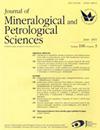Ore and skarn mineralogy of the Eboshi deposit of the Naganobori copper mine, Yamaguchi, Japan
IF 0.9
4区 地球科学
Q4 MINERALOGY
引用次数: 1
Abstract
Mineral assemblages and chemical compositions of ore minerals from the Eboshi deposit, the historical Naganobori copper mine, Yamaguchi Prefecture, Japan were investigated in order to clarify its characteristics as a skarn deposit. Some Bi – , Ag – , and Te – bearing minerals are newly identi fi ed, which contribute updating the mineralization sequence of this deposit. Samples collected from the mine dump are one massive magnetite ore, and copper ores associated with skarn gangue minerals. Skarns are categorized as clinopyroxene skarn, garnet skarn, and wollastonite skarn, and the clinopyroxene skarn is the most dominant. The major ore minerals are chalcopyrite, cobaltite, and early – stage pyrite (Py – I) and later stage pyrite (Py – II). Py – II is enriched in arsenic (~ 5.19 As wt%). The Bi – , Ag – , and Te – bearing minerals, such as native bismuth, bismuthinite, wittichenite, emplectite, tsumoite, kawazulite, hessite, and matildite are minor ore minerals. Based on the mineral assemblages and textures of the specimens examined, four ore mineralization stages were recognized; the ore mineralization stage I is characterized by the major ore minerals such as chalcopyrite, bornite, pyrrhotite, sphalerite, and Py – I. The stage II is de fi ned by the mineralization of cobaltite, Py – II, and Bi( – Cu) – bearing sul fi des such as native bismuth, bismuthinite, and wittichenite. The mineralization stage III is characterized by the Ag – and/or Te – bearing ore minerals such as matildite, kawazulite, tsumoite, and hessite. The stage IV is characterized by chalcopyrite veins cutting the main skarn masses and the host limestone. The mineralogical properties and mineralization process of the Eboshi deposit is similar to those of the skarn deposits in the Yamato mine and the Tsumo mine, and consistent with common skarn – type deposits associated with ilmenite – series granitoids in the San – yo Belt, which are characterized by the occurrence of minor Ag – and/or Te – bearing ore minerals.日本山口长野博里铜矿埃布石矿床的矿石和矽卡岩矿物学
为了阐明其矽卡岩型矿床的特征,对日本山口县历史悠久的长野原铜矿埃布石矿床的矿物组合和矿物化学成分进行了研究。一些含Bi、Ag和Te的矿物是新发现的,它们有助于更新该矿床的矿化序列。从矿山排土场采集的样品是一种块状磁铁矿,以及与矽卡岩脉石矿物有关的铜矿。矽卡岩分为单斜辉石矽卡岩、石榴石矽卡岩和硅灰石矽卡岩,其中以单斜辉石夕卡岩为主。主要矿石矿物为黄铜矿、钴矿、早期黄铁矿(Py–I)和晚期黄铁矿(Py-II)。Py–II富含砷(~5.19 As wt%)。含铋、Ag和Te的矿物,如天然铋、铋矿、硫铁镍矿、铁闪锌矿、铁云母、川流石、赤铁矿和钛铁矿,都是次要的矿石矿物。根据样品的矿物组合和结构,识别出四个成矿阶段;矿石矿化阶段I的特征是主要矿石矿物,如黄铜矿、斑铜矿、磁黄铁矿、闪锌矿和Py–I。阶段II的特征是钴矿、Py–II和含Bi(–Cu)硫化物的矿化,如天然铋、铋矿和硫铁矿。矿化阶段III的特征是含Ag和/或Te的矿石矿物,如钛铁矿、川流石、铁闪锌矿和赤铁矿。第四阶段的特征是黄铜矿矿脉切割了主要的矽卡岩块和主石灰岩。埃博希矿床的矿物学性质和矿化过程与大和矿和津磨矿的矽卡岩矿床相似,并与San–yo带中与钛铁矿-系列花岗质岩石相关的常见矽卡岩型矿床一致,其特征是出现少量含Ag和/或Te的矿石矿物。
本文章由计算机程序翻译,如有差异,请以英文原文为准。
求助全文
约1分钟内获得全文
求助全文
来源期刊
CiteScore
1.80
自引率
14.30%
发文量
5
审稿时长
>12 weeks
期刊介绍:
The Journal of Mineralogical and Petrological Sciences (JMPS) publishes original articles, reviews and letters in the fields of mineralogy, petrology, economic geology, geochemistry, planetary materials science, and related scientific fields. As an international journal, we aim to provide worldwide diffusion for the results of research in Japan, as well as to serve as a medium with high impact factor for the global scientific communication
Given the remarkable rate at which publications have been expanding to include several fields, including planetary and earth sciences, materials science, and instrumental analysis technology, the journal aims to encourage and develop a variety of such new interdisciplinary scientific fields, to encourage the wide scope of such new fields to bloom in the future, and to contribute to the rapidly growing international scientific community.
To cope with this emerging scientific environment, in April 2000 the journal''s two parent societies, MSJ* (The Mineralogical Society of Japan) and JAMPEG* (The Japanese Association of Mineralogists, Petrologists and Economic Geologists), combined their respective journals (the Mineralogical Journal and the Journal of Mineralogy, Petrology and Economic Geology). The result of this merger was the Journal of Mineralogical and Petrological Sciences, which has a greatly expanded and enriched scope compared to its predecessors.

 求助内容:
求助内容: 应助结果提醒方式:
应助结果提醒方式:


